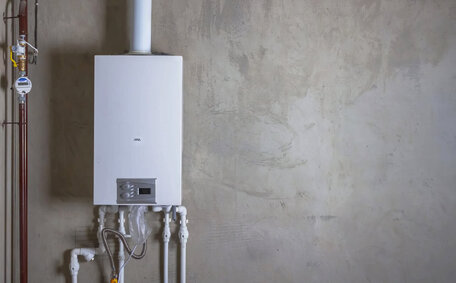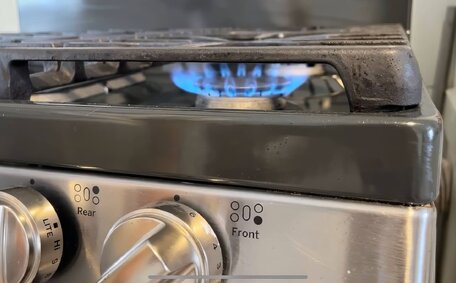Identifying Your Gas Meter and Main Shut-Off Valve
Your gas meter is typically located outside, on an external wall near where your water system is installed. Sometimes, it’s enclosed in a metal box marked 'Gas’, containing the shutoff valve which enables you to cut the gas supply to your property and hot water system.
Typically, the shut-off valve is a lever or handle that you turn a quarter-turn to halt the gas flow. Make sure your household can find your meter box location and identify the valve within to turn off gas. This is critical in an emergency gas leak situation.
Gas appliances, such as hot water systems, stoves, and heaters, are equipped with individual shutoff valves for safety. Safety regulations require these valves to be within 2 metres of the appliance, in the same room, and easily accessible. Make certain the gas pipe valve is accessible to independently shut off appliances as needed.
Steps to Safely Shut Off Your Gas
If you suspect a gas leak or need to perform an emergency gas shut-off, follow these steps:
- Evacuate everyone from the building to a safe distance outside, away from the gas. Ensure no one manipulates any light switches or electrical switches, which could ignite flammable gases.
- If safe, open all doors and windows to ventilate and switch off the water gas connection to air out the area.
- Use your sense of smell to help pinpoint the source of the leak along the gas line. If it’s coming from an appliance, for a gas leak 1800 427 hotlines can provide assistance to turn off the individual appliance valve if possible.
- Find the main shut-off valve on your gas meter, usually a quarter-turn lever handle in the meter box outside your home. Give it a quarter turn to cut off your gas supply.
- Reach out to your gas company from outdoors using your mobile phone to report the issue if circumstances allow. Otherwise, in a fire emergency, contact services on 000.
- Do not re-enter the building until emergency services say it is safe to do so.
It’s imperative that the safety shutoff valve is readily accessible for emergencies. Never hesitate to turn your attention to the shut down process when appliances pilot lights gas odour is detected or if you suspect a leak.
Ventilating the Area and Checking for Leaks
After shutting off the main supply, it’s crucial to rapidly ventilate your home to prevent dangerous gas buildup. Open all doors and windows in your house gas areas, ensuring complete ventilation to permit fresh air circulation.
Immediately inspect rooms with gas appliances, such as stoves and central heating systems. Check your surroundings for the telltale rotten egg smell that indicates gas leaks. Be alert for the characteristic gas smell and any hissing sounds that suggest escaping gas.
Do not turn on any lights or electrical devices during this process as they could produce a spark and ignite leaking gas causing an explosion. Particularly avoid igniting flames, smoking, or using lighters when gas sources are being turned on.
If you still smell gas or detect signs of a gas leak after shutting off the main valve and your appliances’ valves, turn off your home’s electricity, evacuate everyone and call the fire department immediately on 000. Do not re-enter until emergency crews have given the all clear that it is safe to go back inside.
Calling the Professionals: Gas Leaks and Emergencies
Should a gas smell or hissing persist after valve shut-offs, immediately call gas professionals.
For urgent assistance with gas leaks or gas work emergencies, call our Glenhaven Plumbing experts, licensed gasfitters, on 1300 349 338. Our team of licensed gas fitters is expertly trained to inspect your system, locate breaches, and repair them.
We are available 24/7 to respond rapidly to emergency call outs. Our technicians address gas-related issues to secure the area, repair the leak, and safely restore your gas supply.
For severe gas leak scenarios, promptly contact your gas supplier’s emergency number, which can usually be found on your latest meter box utility bill. Alerting emergency services by calling 000 is warranted if there is an immediate threat to health and safety.
Engage emergency services without delay if there’s any doubt about the need for emergency action. Gas leaks, heavier than air, can quickly escalate into dangerous events, so it’s always best to err on the side of caution when it comes to the safety of your family.
Drop by our website to read our insights on our 24/7 emergency plumbing services. Or Call us on 1300 349 338 to speak with our friendly team about any of your use gas fitting needs.
Warning Signs of a Gas Leak
There are several key signs that may indicate the presence of a dangerous gas leak in your home or property:
- Smell - Natural gas lpg and lp gas additives give off a potent rotten egg or sulphur-like odour to alert people of leaks.
- Sound - A hissing noise from appliances or lines can reveal gas escaping.
- Vegetation - Australian gas leaks killing plants or grass in otherwise lush areas can hint at underground pipe breaches.
- Flames - Yellow flames instead of blue, flames lifting off burners or appliances pilot lights that frequently blow out may imply issues with gas flow, potentially affecting gas appliances and heating.
Take immediate gas safety precautions Act swiftly by following the appropriate emergency shut-off procedures.
Immediately call a licensed plumber, like our Glenhaven Plumbing team at 1300 349 338, for any gas leak concerns.
When to Call Emergency Services
Contact emergency services immediately for severe or unresolved gas leaks, even if you’ve shut off the main valves. Dial 000 if you experience any of the following:
- You still detect a strong smell of gas in multiple rooms after shutting off the main valve.
- You can hear a hissing noise indicating gas is still escaping rapidly from somewhere.
- The leak seems to be from your underground gas pipes rather than appliances.
- Gas been leaking have killed vegetation or are visibly bubbling up from the ground outside.
- An explosion or fire related to the gas leak has occurred already.
When contacting emergency services, remember to:
- Provide your property’s full address and a concise description of the gas leak.
- Follow any instructions given to you by the operator.
- Be ready to promptly evacuate the area upon instruction.





